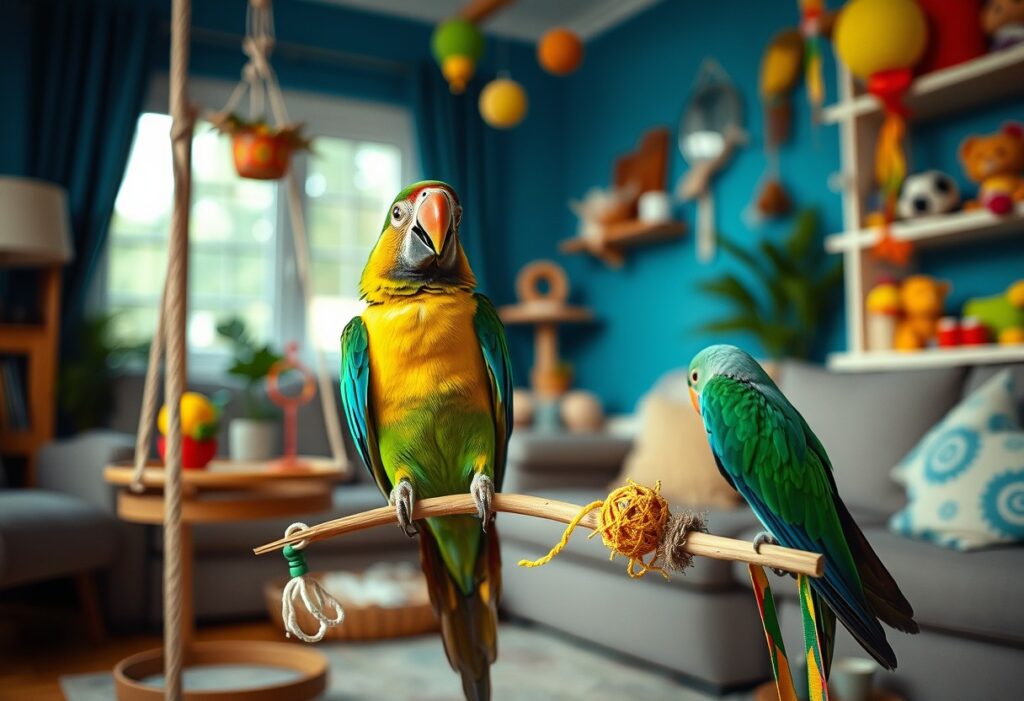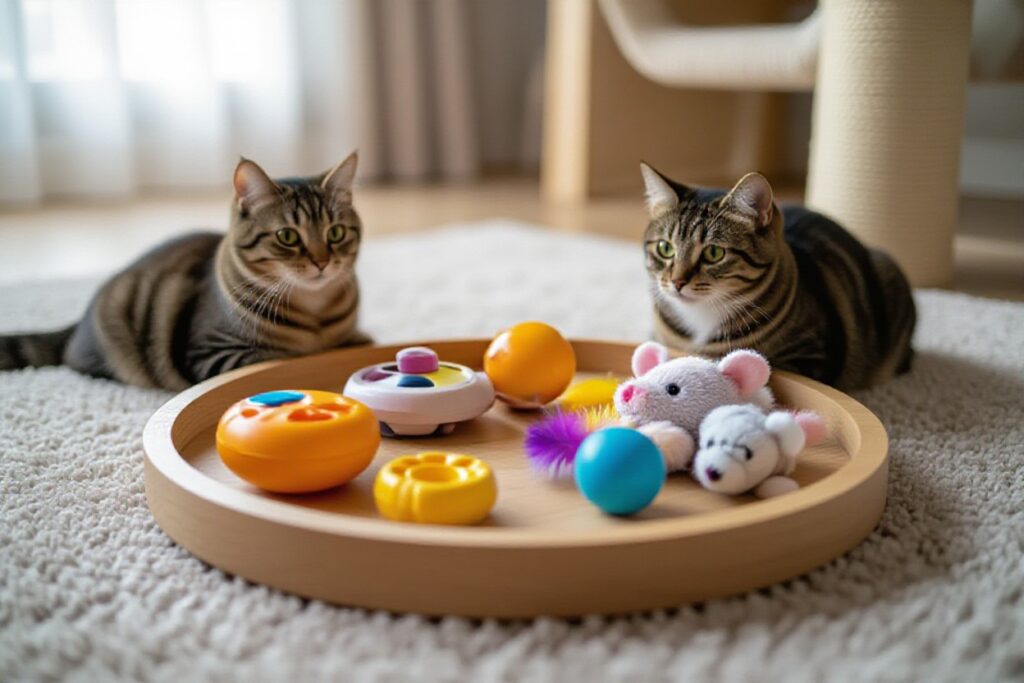Just as play is vital for human development, providing your bird with opportunities for play is crucial for their well-being. Engaging in play helps stimulate your bird’s mental and physical health, reduces stress, and encourages social interaction. Without adequate playtime, your feathered friend may experience boredom, behavioral issues, or even depression. By incorporating toys, games, and interactive activities into your bird’s daily routine, you can enhance their quality of life and strengthen your bond with them. Understanding the importance of play will empower you to create a fulfilling environment for your pet.
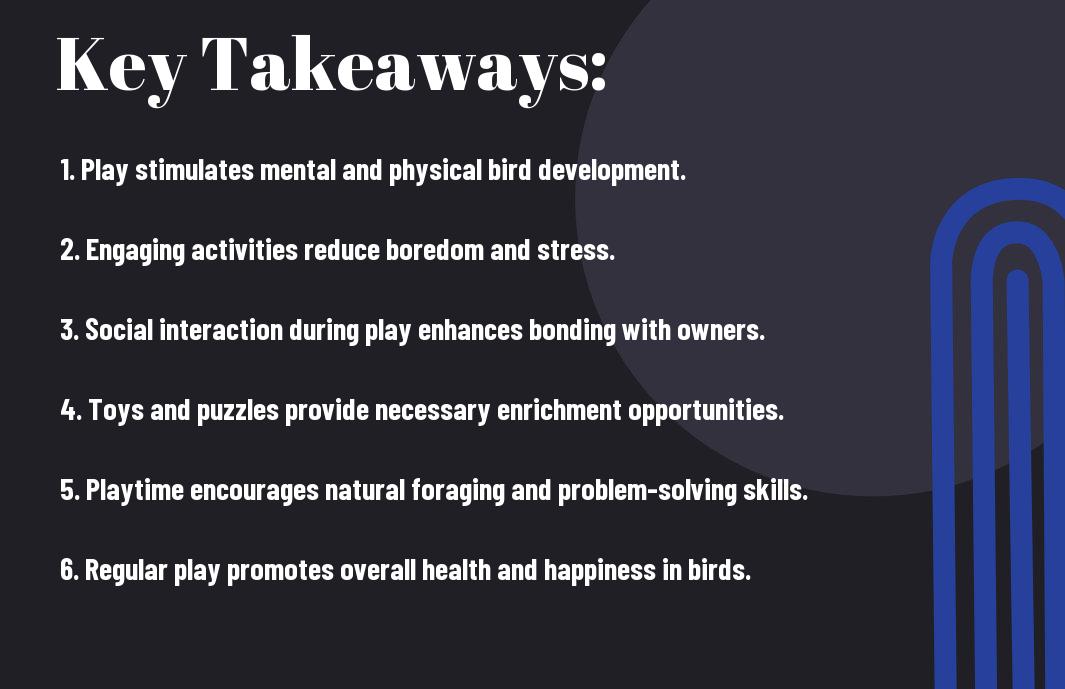
Understanding Play Behavior in Birds
For bird owners, grasping the intricacies of your feathered friend’s play behavior can greatly enhance their well-being and happiness. Birds, like many animals, engage in play as a natural part of their development and behavior. Understanding what play means for your bird not only enriches their lives but also strengthens the bond you share. Through interactive play, you can stimulate their minds and help them develop vital skills.
The Importance of Play
Importance of play cannot be overstated when it comes to your bird’s health and happiness. Engaging in playful activities allows birds to exhibit their natural instincts, promoting physical fitness and mental agility. Play provides vital *cognitive stimulation*, which is crucial in preventing boredom-related behaviors, such as excessive screaming or feather plucking.
Additionally, play can contribute to improved social dynamics if you have multiple birds. It encourages healthy interactions and socialization. This social play can mitigate aggression and support healthy relationships between your birds, ensuring a harmonious environment. When you commit time to play with your bird, you create memorable experiences that foster trust and enhance your companionship.
Types of Play: Social vs. Solitary
Behavior in play among birds can generally be categorized into two types: social and solitary. Social play occurs when birds engage with each other, using cooperative behaviors that encourage bonding and social learning. This type of play is vital for birds that thrive in flocks, as it reinforces social structures and hierarchy.
On the other hand, solitary play calls for individual bird engagement with toys or environmental objects. This type of play is crucial for birds that may not have a companion, providing mental stimulation and physical exercise. Introducing toys that challenge your bird’s intelligence, like puzzle feeders, can keep them entertained and encourage problem-solving skills.
| Type of Play | Characteristics |
|---|---|
| Social Play | Engagement with other birds; promotes social bonding. |
| Solitary Play | Interaction with toys or the environment; enhances problem-solving. |
| Active Play | Involves physical movement, like flying or climbing. |
| Exploratory Play | Includes investigating new objects or environments. |
| Imitative Play | Mirroring behaviors seen in other birds; supports learning. |
The types of play you observe in your bird will often depend on their species and personality. For instance, parrots are known for their engaging social interactions, while some finches may prefer independent exploration. To facilitate playful behaviors, ensure a variety of toys and stimuli are available. Regularly rotating these items can keep the play environment fresh and exciting, encouraging your bird to explore and stay active.
- Encourage social play to strengthen relationships among birds.
- Foster solitary play with toys to keep individual birds engaged.
- Balance playtime with both active and exploratory activities.
- Provide a mix of imitative play opportunities to enhance learning.
- Knowing how to balance these will ensure a happy and healthy bird.
Importantly, understanding your bird’s play behavior is paramount in providing a fulfilling environment. By monitoring their play interactions and preferences, you can tailor their activities to suit their needs, ensuring that play remains a positive part of their daily routine. With awareness and attention, you can create a world of exploration and joy for your winged companion.
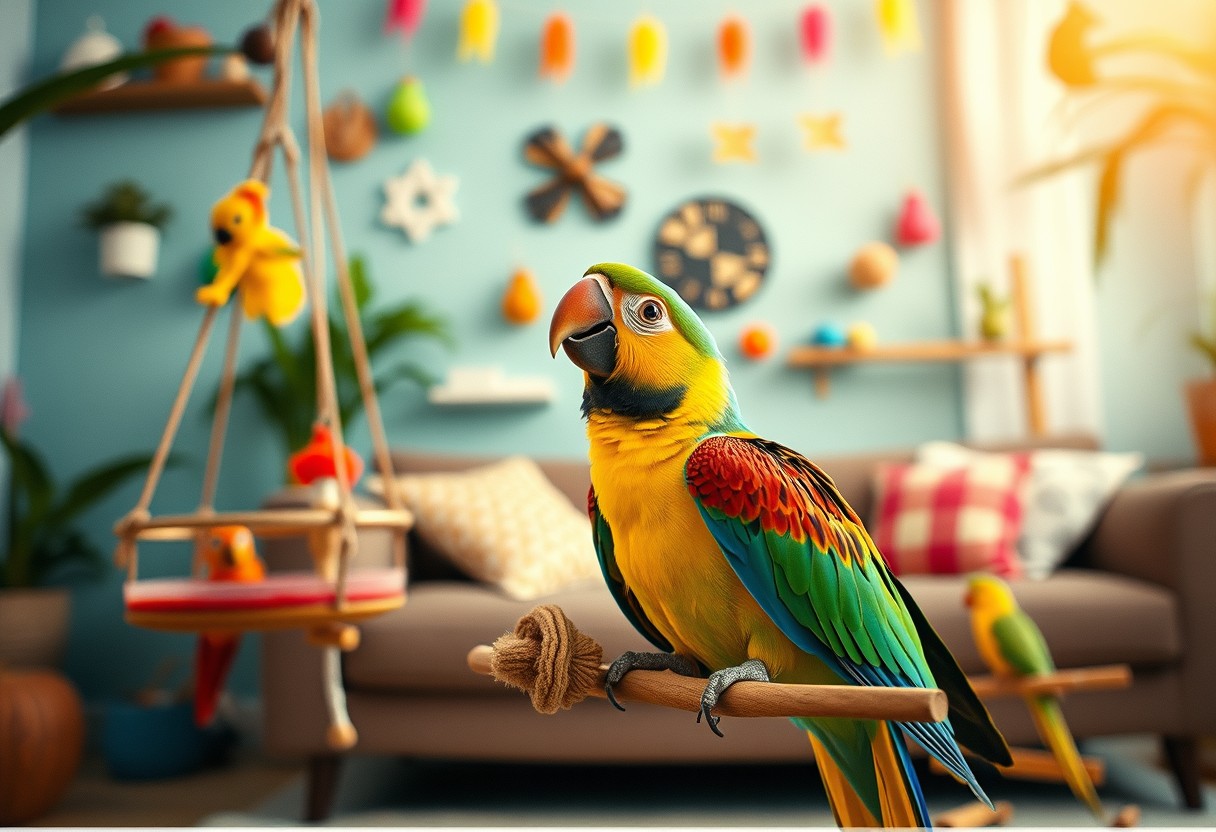
The Psychological Benefits of Play
Assuming that you recognize the importance of play in your bird’s life, it is imperative to understand the profound psychological benefits it offers. Your feathered friend thrives on interaction that stimulates both their body and mind. Engaging in play can not only elevate their mood but also enhance their overall well-being, making it a fundamental aspect of their daily routine.
Stress Relief and Mental Health
On a daily basis, your bird may experience various stressors, from environmental changes to potential threats around them. Play serves as an invaluable outlet for releasing pent-up energy and tension. By providing toys or engaging in interactive games, you create an environment where your bird can feel safe and relaxed, which is crucial for their mental health. When a bird is allowed to play, you may notice an increase in their overall happiness and a decrease in behaviors born from anxiety.
Cognitive Development and Problem-Solving
Stress can limit your bird’s ability to think and act freely. However, play encourages exploration and creativity, allowing your bird to hone their problem-solving skills. When they engage with various toys that challenge their abilities, they develop important cognitive skills that not only keep them mentally stimulated but also boost their self-esteem. Implementing puzzles or toys that require manipulation will further enhance their reasoning abilities, ensuring that they remain engaged and stimulated.
It is in this playful exploration that your bird will experience profound cognitive growth. By introducing them to challenging activities, you are actively supporting their ability to adapt, learn, and overcome obstacles. This not only allows your bird to engage in meaningful play but also prepares them to navigate their environment more effectively. Keep in mind, integrating play through constructive activities not only enriches your bird’s life but also solidifies your bond and fosters a happy, well-adjusted companion.
Physical Benefits of Play
Your bird’s health and well-being are strongly influenced by the physical activities they engage in during play. The act of playing should not be dismissed as merely a fun pastime; instead, it is an crucial aspect of their overall physical health. Through play, your bird can engage in vital exercises, promoting cardiovascular fitness, muscle development, and maintaining healthy body weight. When birds explore, climb, and manipulate toys, they are not just entertaining themselves; they are participating in natural behaviors that keep them physically fit and stimulated. It is crucial to provide a variety of play opportunities tailored to your bird’s needs to ensure they remain active and healthy.
Exercise and Physical Well-Being
An active bird is a happy bird, and play serves as an engaging way for your feathered friend to exercise. Just like humans, birds require regular physical activity to avoid conditions such as obesity, which can lead to severe health issues over time. Encouraging your bird to play with toys, climb on perches, and engage in social play with you or other birds will contribute significantly to their physical well-being. Take the time to rotate toys and provide new play experiences to keep your bird motivated and interested in exercising.
Enhancing Coordination and Agility
Enhancing your bird’s coordination and agility is another critical benefit of play. Birds are naturally adept climbers and flyers, and play encourages them to refine these skills through various activities. When your bird interacts with different toys or navigates their environment, they are improving their balance and motor skills. This improved coordination is crucial not only for physical fitness but also for their overall confidence and ability to explore their surroundings safely.
Agility is an crucial characteristic that allows your bird to escape potential dangers and navigate complex environments effortlessly. By incorporating playtime into their routine, you are helping them to develop their reflexes and hand-eye coordination. These skills not only benefit them physically during play but also contribute to their safety, making them better equipped to respond to challenges in their environment. Regular playtime can significantly enhance your bird’s agility, ensuring they remain active and capable of adapting to different situations.
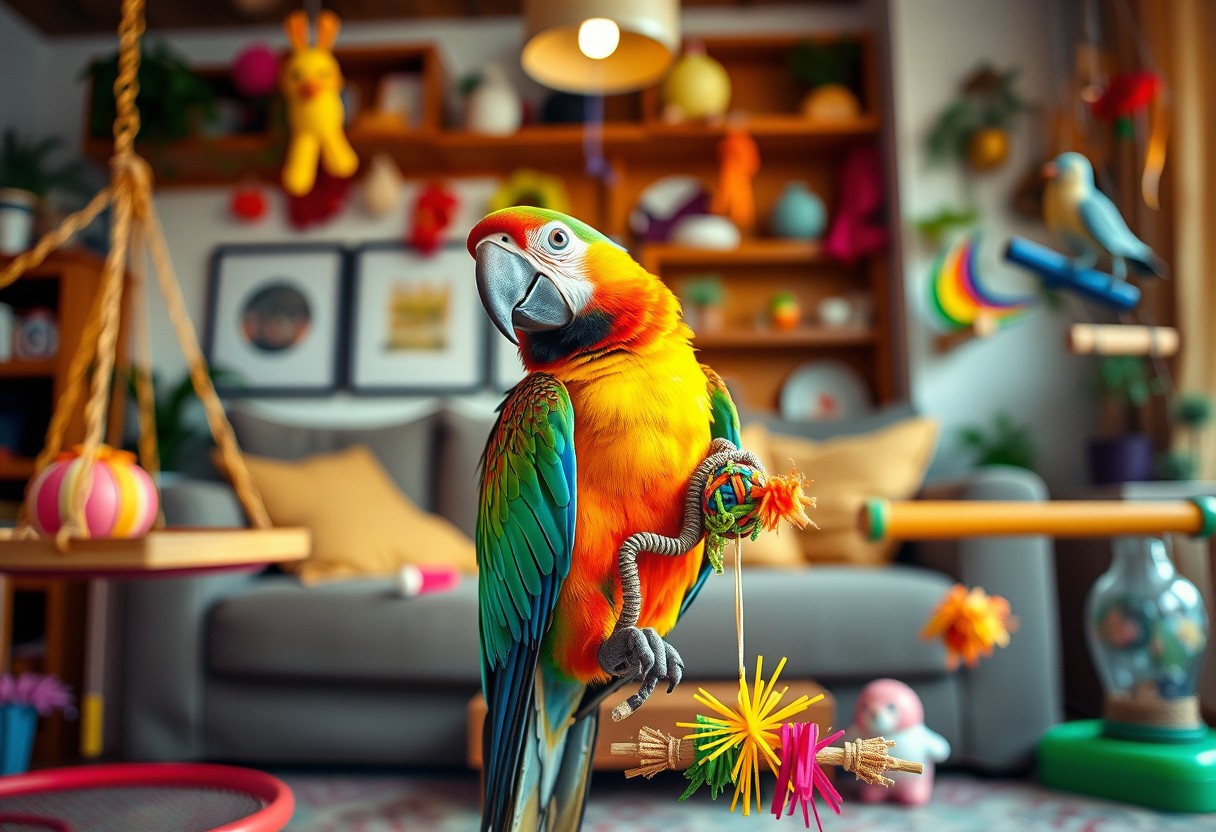
Implementing Play in Your Bird’s Routine
Now that you understand the significance of play in your bird’s life, it’s time to discuss how to implement engaging play activities in your bird’s daily routine. A well-rounded playtime not only stimulates your feathered friend but also reinforces the bond between you and your pet, enhancing their quality of life and overall happiness. The process starts with choosing the right toys and creating an enriching environment that encourages exploration and interaction.
Choosing the Right Toys
On your journey to selecting the perfect playthings for your bird, it’s vital to consider their species, size, and preferences. Birds are inquisitive creatures, often drawn to toys that challenge their intellect and dexterity. Look for toys that are not just colorful but also have a variety of textures and shapes, allowing your bird to engage in different play styles. **Avoid toys with small parts that can pose a choking hazard, and prioritize those made of non-toxic materials to ensure your bird’s safety.**
On top of that, rotating toys regularly can help maintain your bird’s interest and stave off boredom. **Introduce new toys gradually, as sudden changes can cause anxiety in some birds.** Keep a close eye on the toys to ensure they remain in good condition, discarding any that become damaged, as sharp edges or loose components can be dangerous to your avian buddy.
Creating an Enriching Environment
Implementing play is not limited to just toys; it’s about creating an environment filled with opportunities for fun and exploration. You can achieve this by adding perches, climbing structures, and hiding treats around their space to stimulate natural foraging behaviors. **Ensure that the play area is safe and free from dangerous items such as electrical cords, toxic plants, or items that could be swallowed.**
Your bird’s environment should encourage mental and physical activities that promote well-being. Consider having areas where your bird can climb, swing, and hide, as well as activities that involve problem-solving, such as puzzle feeders. **The more engaging their space is, the more they will benefit from play.** Proper enrichment not only keeps your bird entertained but also reinforces their natural instincts, contributing positively to their emotional health.
To wrap up
With these considerations, it’s clear that play is an integral part of your bird’s life, contributing significantly to its overall well-being and behavior. By engaging your feathered friend in various forms of play, you not only promote mental stimulation but also help develop physical skills and strengthen your bond. Whether through interactive toys, social playtime, or creative activities, you can enrich your bird’s environment in meaningful ways that cater to its natural instincts.
Ultimately, understanding the role of play in your bird’s life empowers you to create a more fulfilling and stimulating home for your companion. As you consider the types of play that best suit your bird’s personality and preferences, remember that your involvement is key. Regularly introducing new challenges and experiences will keep your bird engaged, happy, and healthy, ensuring that playtime remains a rewarding aspect of your shared life together.
FAQ
Q: Why is play important for my bird’s mental health?
A: Play is crucial for your bird’s mental health as it stimulates their natural curiosity and helps alleviate boredom. Birds are intelligent and social creatures that thrive on engagement and interaction. Play encourages exploration, problem-solving, and cognitive development, which can lead to a happier, more balanced bird. Additionally, engaging in regular play can decrease the likelihood of behavioral issues, such as feather plucking and aggression, by providing an outlet for their energy and natural instincts.
Q: What types of toys or activities are best for promoting play in my bird?
A: The best toys and activities for your bird will depend on its species and individual personality, but some popular options include swings, climbing ropes, and foraging toys that challenge their problem-solving skills. Interactive toys that make noise, move, or require manipulation can keep your bird engaged. Additionally, providing opportunities for social play, such as spending time with other birds or their human caregivers, can enhance their playtime experience. Always ensure that toys are safe and appropriate for your bird’s size and species to prevent injury.
Q: How can I encourage my bird to play if it seems disinterested?
A: If your bird appears disinterested in play, consider introducing new toys or rotating existing ones to maintain novelty. Birds can be hesitant to engage with unfamiliar objects, so starting slowly and encouraging exploration through gentle encouragement can help. Play together with your bird by demonstrating how to use the toys or engaging in interactive games such as fetch or hide and seek. Building a safe play environment where your bird feels secure and comfortable can also encourage them to explore and partake in playful activities.
